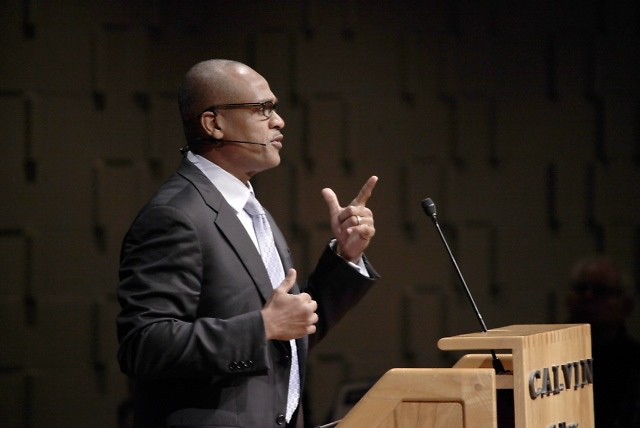With temperatures hovering in the teens outside, Ralph Edmond started his talk on Friday by suggesting that Calvin College change the January Series to the summer series. He first visited Grand Rapids in 1999––during the much warmer month of June––to attend a Partners Worldwide conference called “Business as Calling.” This inspired him and two fellow entrepreneurs to establish Haiti Partners for Christian Development with the goal of connecting Haiti’s rich and poor people together and creating jobs.
Born and raised in Port-au-Prince as a Catholic, Edmond called his sister later that day and told her, “Their God is different.” She replied, “No, their God is the same.They are different.”
Edmond grew up in a privileged family as a pharmacist’s son and studied medicine and pharmacy. He later moved to New York City to study business and marketing management and after graduating in 1989, started a pharmaceutical company in Haiti called Farmatrix. Edmond and partner Alain Vincent aspired to do business the right way by using local resources and, unlike many businesses in Haiti, don’t pay bribes or cheat on their taxes.
Edmond chose to highlight four main issues facing Haiti in his talk on Friday: corruption, poverty, a lack of investors and the need for more dialogue between the social classes.
“You realize I didn’t mention natural disasters,” says Edmond. “It wasn’t the earthquake that killed all these people, it was the buildings.”
Corruption
“Everybody in Haiti is corrupt,” Edmond divulges, then laughs and says, “I hope there is no one from the Haitian police here!”
Edmond believes the best way to deal with corruption is to “bring it to light” and to create dialogue and programs addressing it. He and his partner encourage other companies to follow their lead by paying taxes honestly and to avoid bribes to government officials. He also wishes the president would bring decency, honesty and integrity into public affairs.
Poverty
“The poverty in Haiti is extreme,” Edmond tells the audience. “Until you see it, you won’t believe it.”
By this he means teach people skills, give them confidence and show them alternatives to joining a gang. He says it’s important to develop social programs for the youth before they turn to crime.
Investment
Non-Governmental Organizations (NGOs) who work in Haiti often import goods needed to provide their services. Edmond persuades them to buy locally and use Haitian resources already available.
He encourages private investors and business people to come to Haiti––“especially when it’s this cold”––and also wants the churches to shift from relief charity to investments.
Dialogue
Dialogue offers the best solution of all to Haiti’s problems, Edmond believes, and that’s why he participates in potentially dangerous mentoring programs with gang members.
“We need to transform walls to bridges and go toward the other side,” he says.
He maintains faith that everyone has a human side and most people’s behavior is reversible. Edmond said he’ll continue talking loud to anyone who will listen and then they can’t shut him down.
“The only one who can shut me down is my wife!” he jokes.
Edmond told the audience the most important thing is not to lose hope or give up.
“There’s always hope. Let’s talk to each other,” he says.
The Rapidian, a program of the 501(c)3 nonprofit Community Media Center, relies on the community’s support to help cover the cost of training reporters and publishing content.
We need your help.
If each of our readers and content creators who values this community platform help support its creation and maintenance, The Rapidian can continue to educate and facilitate a conversation around issues for years to come.
Please support The Rapidian and make a contribution today.

